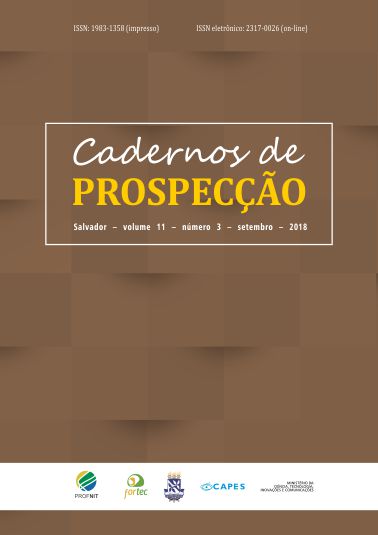Atuação do Núcleo de Inovação Tecnológica do Centro de Desenvolvimento da Tecnologia Nuclear: um Estudo de Caso
DOI:
https://doi.org/10.9771/cp.v11i3.27088Palavras-chave:
Parcerias, Propriedade Intelectual, Transferência de Tecnologia.Resumo
O objetivo deste estudo é realizar um diagnóstico acerca da atuação do NIT-CDTN, por meio de entrevistas com pesquisadores do instituto, abordando as experiências deles no relacionamento com o NIT-CDTN, o conhecimento sobre seu papel institucional e a percepção sobre a relevância e a efetividade dos trabalhos por ele realizados. Em especial, foram analisadas as cooperações feitas entre o CDTN e outras ICTs, empresas e órgãos do governo. Observou-se que os pesquisadores têm por prática adotar parcerias informais, especialmente com universidades, com foco na formação de pessoas. A principal razão é a simplicidade na sua efetivação e a falta de controles e exigências institucionais sobre seus resultados. Os pesquisadores entrevistados reconhecem o papel do NIT-CDTN na defesa da propriedade intelectual, mas nem sempre compreendem bem as demais funções institucionais desse Núcleo e suas limitações. O estudo deixa claro que o CDTN precisa desenvolver esforços para consolidar a presença institucional do NIT-CDTN.
Downloads
Referências
AMARANTE SEGUNDO, G. S. O Novo Marco Legal da CT&I: EC 85 + Lei 13.243/2016. In: SEMINÁRIO LEI DO BEM – COMO AMPLIAR PARCERIAS PÚBLICO-PRIVADAS PARA INVESTIMENTO EM CIÊNCIA, TECNOLOGIA E INOVAÇÃO, Brasília, 7 de dezembro de 2016. Anais... Brasília, dezembro de 2016. Disponível em: <https://www.capes.gov.br/images/lei-do-bem/Apresentacao-Gesil-Sampaio-Amarante-Segundo.pdf>. Acesso em: 27 jun. 2018.
BRASIL. Lei n. 10.973, de 2 de dezembro de 2004. Disponível em: <http://www.planalto.gov.br/ccivil_03/_ato2004-2006/2004/lei/l10.973.htm>. Acesso em: 4 jul. 2017.
BRASIL. Produtivismo includente: empreendedorismo vanguardista. Brasília, DF: Secretaria de Assuntos Estratégicos da Presidência da República, 2015.
BRASIL. Lei n. 4.118, de 27 de agosto de 1962. Disponível em: <https://www.planalto.gov.br/ccivil_03/leis/l .htm>. Acesso em: 4 jul. 2017.
COSTA, K. F. A política de incentivo à Inovação dos Estados Unidos: arcabouço institucional, atores e processos. In: 36º ENCONTRO ANUAL DA ANPOC, GT 12, 2012, Águas de Lindoia. Anais... Águas de Lindoia: ANPOCS, 2012. p. 1-24.
ETZKOWITZ, H.; LEYDESDORFF, L. The dynamics of innovation: from National Systems and “Mode 2” to a Triple Helix of university–industry–government relations. Research Policy, [S.l.], v. 29, p. 109-123, 2000.
MACHADO, H. P. V.; SARTORI, R.; CRUBELLATE, J. M. Institucionalização de Núcleos de Inovação Tecnológica em Instituições de Ciência e Tecnologia da região sul do Brasil. REAd, [S.l.], v. 23, n. 3, p. 5-31, dez. 2017.
NEGRI, F. Novos caminhos para a inovação no Brasil. 1. ed. Washington, DC: Wilson Center, 2018.
RAUEN, C. V. O novo marco legal da inovação no Brasil: o que muda na relação ICT-empresa? Revista Radar, [S.l.], n. 43, p. 21-35, fev. 2016.
VALENTE, L. Hélice tríplice: metáfora dos anos 90 descreve bem o mais sustentável modelo de sistema de inovação. Conhecimento & Inovação, Campinas, v. 6, n. 1, 2010.
Downloads
Publicado
Como Citar
Edição
Seção
Licença
Copyright (c) 2018 Cadernos de Prospecção

Este trabalho está licenciado sob uma licença Creative Commons Attribution-NonCommercial 4.0 International License.
O autor declara que: - Todos os autores foram nomeados. - Está submetendo o manuscrito com o consentimento dos outros autores. - Caso o trabalho submetido tiver sido contratado por algum empregador, tem o consentimento do referido empregador. - Os autores estão cientes de que é condição de publicação que os manuscritos submetidos a esta revista não tenham sido publicados anteriormente e não sejam submetidos ou publicados simultaneamente em outro periódico sem prévia autorização do Conselho Editorial. - Os autores concordam que o seu artigo ou parte dele possa ser distribuído e/ou reproduzido por qualquer forma, incluindo traduções, desde que sejam citados de modo completo esta revista e os autores do manuscrito. - Revista Cadernos de Prospecção está licenciado com uma Licença Creative Commons Attribution 4.0. Esta licença permite que outros remixem, adaptem e criem a partir do seu trabalho para fins não comerciais, e embora os novos trabalhos tenham de lhe atribuir o devido crédito e não possam ser usados para fins comerciais, os usuários não têm de licenciar esses trabalhos derivados sob os mesmos termos.
Este obra está licenciado com uma Licença Creative Commons Atribuição 4.0 Internacional.








